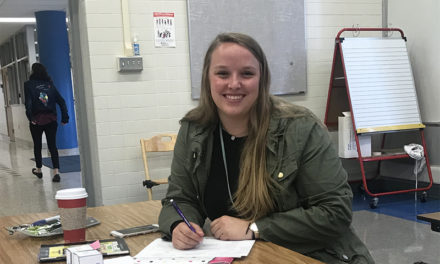While those careers characterized as STEM, science, technology, engineering and mathematics have been the historic domain of white men, STEM classroom has been seeing an evolution with more females moving into the field. At Ship, the evolution has support of bright and engaged students and passionate and committed faculty.
A Female College Student’s Experience in STEM
Allison Melka, junior biology major with a concentration in health professions, is pursuing her love of studying bacteria and her goal to be a research scientist. And says her experience at Ship seems sometimes like there may be more women in the field than men. “I think there’s a good ratio between female to male students.” A Cornell University study published last year, that the ranks of higher education STEM programs are still 58% male.
Melka’s positive perceptions may be bolstered by strong mentoring and support. The American Association of University Women has found that having that representation in class, especially in professors is one of the leading reasons that women drop or stick with a STEM program.
“It’s great to look up to a female professor and being like, wow, you’re the same gender as me and you’re teaching me so much and you know so much”, Melka says.
While seeing women in the classroom has been important, she says the mentoring has been impactful for her future. Melka considers her advisor, Dr. Marcie Lehman, biology of professor, her role model.
Lehman’s guidance has helped Melka find the career path that best suited her. Because she felt comfortable asking Lehman questions, she was able to feel more a part of her department. The experience she had with Lehman opened doors for her.
A Female Professor’s Experience in STEM
Dr. Lehman recalls her college experience as one in which STEM was a much more male dominated field. “I found that I was not being looked at at the same level as my male counterparts.” She said she was persistently asked to give reassurance that she would stick with the program because women were known to drop STEM majors to raise families.
It was a male professor she credits with supporting her through and guiding her future. This mentor, and later friend, has influenced the way she goes about mentoring students and being open and honest about her experiences. And commitment to mentorship and connectivity with students influenced Lehman’s decision to work at Ship. She wanted to have a small school experience so she could work more closely with students, something she found she missed as a grad student on a bigger college campus. From the beginning Lehman says the atmosphere at Ship has been unique. “Women in my department have always been supportive,” as Lehman remembers that there was not competition between students and faculty members, especially between females. It was a welcoming environment.
College During COVID
With the restrictions of COVID, Lehman’s found that it has been harder to stay connected to students, but she has also learned a lot from the experience, too. Having to find new ways to reach out has taught her new teaching techniques.
“At first I was a little nervous because I was just thinking, how am I going to do chemistry online, like how am I going to do anatomy, those kinds of classes, online,” Melka says, “but I think the professors did a great job adapting to what we had to do…and made it comfortable for all the students.”
Knowing that the professors have tried their best to make being in class as comfortable as possible even with all the restrictions has made Melka’s experience more enjoyable.
Agents of Change
This Women’s History month, Shippensburg University’s Melka and Lehman represent the progress women are making in STEM. STEM women are in conversation with one another, lifting each other up, and pushing against old stereotypes. Together they lead and inspire the next generation of women into a limitless future.





